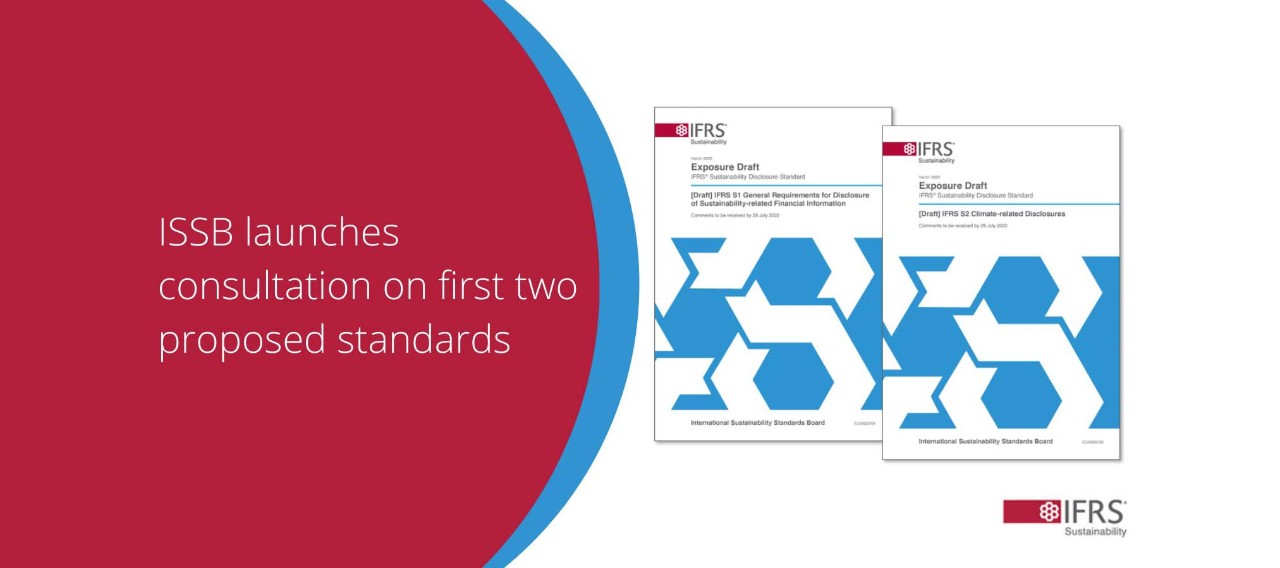Initial Feedback on the ISSB’s Sustainability Reporting Exposure Drafts

- The ISSB is running a consultation on proposed international standards for climate and general sustainability-related financial disclosures
- Below we summarize feedback we have gathered to date from global finance and accounting leaders
In March 2022 the International Sustainability Standards Board (ISSB) released their Exposure Drafts on climate and general sustainability-related financial disclosures. At the time A4S marked this as a key milestone in advancing work we started nearly two decades ago. The consultation is due to close on 29th July 2022.
Since then, we have gathered feedback from extensive discussions with CFOs, accounting bodies and firms, investors and others through roundtables, seminars, surveys, meetings and forums. A summary of the key points we have taken from those discussions is provided below.
Align with relevant existing and emerging sustainability reporting standards to promote harmonization and convergence, to the greatest extent possible
There is an urgent need for a global set of internationally recognized sustainability disclosure standards. There is positive support for the ISSB’s alignment to a number of existing standards and frameworks – which is apparent within the Exposure Drafts – and a strong desire for the ISSB to continue to promote harmonization with existing and emerging standards to the greatest extent possible. The ISSB is well suited to establish a comprehensive baseline that can enhance compatibility and interoperability to deliver a global sustainability disclosure system. However, this requires the ISSB to undertake additional technical work with other standard setters in the sustainability reporting world to align definitions and achieve consistency.
The materiality of sustainability-related risks and opportunities is dynamic and industry-specific
The ISSB has decided to focus on enterprise value to assess the materiality of sustainability-related risks and opportunities. Our experience with sustainability disclosure finds that materiality is dynamic, with sustainability-related risks and opportunities moving across the materiality spectrum. In some cases, issues that are initially of interest to society and other stakeholders can quickly become material to the enterprise value of an organization. Applying the ISSB’s definition is likely to present a number of challenges.
Further, organizations and investors will need to continue to draw on standards, such as those developed by the GRI, which use an impact lens to determine materiality in order to understand fully the impact of their activities and investments, and to channel finance towards sustainable outcomes at the scale so urgently needed. Moreover, recognizing the dynamic nature of materiality for sustainability-related issues and aligning, where possible, with multistakeholder reporting will reduce the risk of divergence and duplication for preparers and support global alignment.
Our experience has also found that the materiality of sustainability-related risks and opportunities can vary based on an organization’s business model, industry and geography. Careful consideration needs to be given to sector and geographical sustainability issues as standards are developed. It is important that the nuances and detail are addressed. There is a lot of support for the industry specific reporting requirements included in the exposure drafts. However, as they are largely unchanged from the existing SASB standards, it will be important to internationalize them and develop plans to maintain their relevance and applicability.
Clear guidance is needed to enable comparability and to produce assurance-ready disclosures (verifiability), particularly on definitions, estimates and assumptions
Both preparers and investors have observed that there are several challenges to ensuring the comparability of sustainability-related information. This includes differences in the underlying methodologies applied, limited disclosures on estimates and assumptions, and preparers applying their own interpretation of the guidance. It has also been noted that the exposure drafts do not prescribe specific methodologies, which could lead to a variety of methods and assumptions being adopted. While appreciative of the flexibility in approaches, ensuring consistency over time will be key as the standards are subsequently updated. Even the most experienced reporters and users face challenges with these disclosures. A particularly challenging area relates to Scope 3 emissions, which requires estimations and input from a variety of internal and external sources. The ISSB exposure drafts are working towards providing the level of clarity needed to address challenges with today’s sustainability-related financial reporting. As the exposure drafts further develop and additional standards are introduced, it will be important for the ISSB to continue to evaluate the standards to ensure the necessary clarity for reporting entities is achieved.
Data quality will improve over time, in the interim information that is most useful for decision making should be emphasized
Preparers today are developing the systems and processes required to provide relevant, transparent sustainability disclosure in an effective and efficient way. This includes efforts to improve data quality and to align the robustness of sustainability-related financial reporting with that used for traditional financial reporting. However, it will take time for reporting entities to implement the required systems and to upskill finance teams to be able to respond in an effective manner. Ultimately, reporting is a means to an end – providing decision-useful information. This focus on what information is needed for action is critical and can help get the right balance as organizations take steps to improve systems and data quality.
Connectivity between financial and sustainability-related information is fundamental so standards should be aligned
The environmental, social and economic issues covered by sustainability disclosure standards frequently have implications for financial reporting. For example, sustainability factors may impair goodwill, reduce the value and useful life of an asset or have implications for an entity’s inventory balances. The ISSB has recognized the need for reporting entities to assess and disclose the connectivity between traditional financial reporting and sustainability-related financial reporting, but it will be important for the ISSB to continue to work in close collaboration with the International Accounting Standards Board (IASB) to align standards further where they connect. A common conceptual framework utilized by the IASB and ISSB can lay the foundation for an aligned approach to standard setting, which will also promote aligned reporting.
Climate first, then rapidly move to cover other sustainability topics
Given the urgency of the climate crisis, as well as significant investor demand for climate-related disclosures, the Exposure Draft IFRS S2 on climate-related disclosures is seen as an important development. We also found support for the inclusion of disclosure for Scope 1, 2 and 3 emissions based on the GHG Protocol, as this is consistent with current disclosure practices and reflective of the approach needed for preparers and users to understand climate-related risks and opportunities.
Other pressing environmental and social risks are closely integrated with climate. Focusing on climate only will not provide the complete sustainability reporting standards needed by investors and other stakeholders. Therefore, we see strong support for the ISSB to move forward quickly with other sustainability disclosure standards in the near future, leveraging the significant body of sustainability disclosure standards used on a voluntary basis today and working in close cooperation with other standard setters to achieve consistency and alignment.



